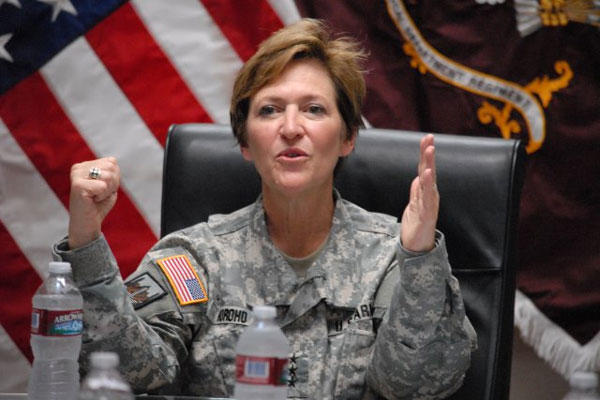A spokeswoman denied that the U.S. Army surgeon general tried to delay the release of concussion data and manipulate reporters.
The New York Times on Tuesday reported that during a Sept. 16 meeting at the Pentagon, Lt. Gen. Patricia Horoho, the Army surgeon general, recommended to Lt. Gen. Robert Caslen, the superintendent of the U.S. Military Academy at West Point, that the Army delay responding to the newspaper's request for information about concussions resulting from mandatory boxing classes at the school -- then suggested trying to get competing newspapers to cover a more favorable study.
"Despite what was reported in the New York Times the Surgeon General never directed or advised anyone to delay the release of this data," according to a statement Wednesday from Maria Tolleson, a spokeswoman for U.S. Army Medical Command, which is overseen by Horoho.
"Additionally, the Surgeon General strongly denies that she has ever endeavored to kill a story in the media," it states.
The Times published a summary of the meeting that was created by West Point staff and quoted Horoho as follows: "I recommend you let us publish this article BEFORE you release the FOIA to the NYT reporter. Timing is everything with this stuff. We were able to do something similar with the 4th ID when the Colorado Springs Gazette attacked them with treatment of wounded warriors last year -- killed any scrutiny from the media and killed their story."
As Horoho told The Times, "she expressly stated that the remarks attributed to her were incorrect and that the issue of Traumatic Brain Injury is one that she takes very seriously and would never in any way compromise or cover up," according to the statement from Tolleson.
In a separate news article, The Times reported that boxing accounts for 20-25 percent of concussions at West Point, the Air Force Academy and the Naval Academy.
The issue of concussions at the service academies made headlines last month after video surfaced of the annual free-for-all pillow fight among plebes at West Point turned into a bloody brawl. The final injury toll was 24 concussions, a broken nose, a dislocated shoulder, a hairline fracture of a cheekbone and possibly a broken leg. All of the injured returned to duty.
Afterward, Caslen said of the Aug. 20 incident, "I assure you that the chain of command will take appropriate action when the investigation is complete."
Horoho, a nurse by training and the first non-physician and the first female to be appointed to the position of Army surgeon general, referenced the incident during the meeting at the Pentagon.
"Next time when cadets are injured and it is sensationalized, please let me know ahead of time," she said, according to the meeting summary. "I can help shape the reaction from my position as Surgeon General. I actually learned of this incident from the news."
In February, after Horoho held a roundtable session with reporters at the Pentagon to discuss some of issues involving Warrior Transition Units at Fort Carson, Colorado, the Army had to put out corrections to what she had said.
The roundtable also led Military.com and other news organizations to seek copies of an Article 15-6 fact-finding investigation by Army Brig. Gen. John Sullivan, who concluded that there was a "toxic environment" at Fort Carson in the treatment of wounded warriors.
"The potential tone of a news story does not and has not ever dictated our level of effort or cooperation," according to the statement from Tolleson.
"We know that we operate under a level of heightened scrutiny, and we welcome it, because the constant crucible of media scrutiny, in the service of our Soldiers and their Families, has served as a focal point for us to continuously improve our services, our programs, our processes, and our policies," it states.
--Richard Sisk contributed to this report.
--Brendan McGarry can be reached at brendan.mcgarry@military.com.





























